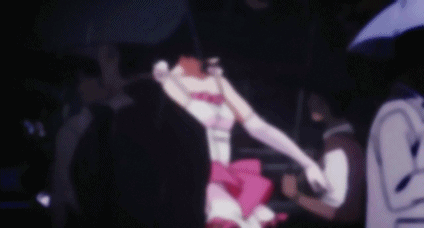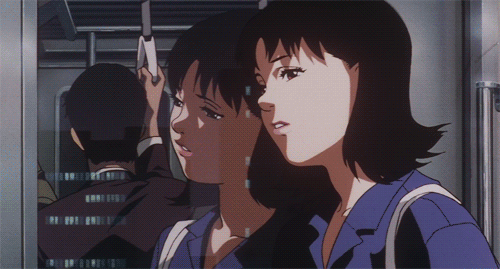|
To give a director credit for a successful adaptation, one would have to see what makes that adaptation so successful in the first place. Let look through the lense of a Satoshi Kon’s previous work and see how the fragments of that adaption ended up making Paprika a nice improvement.
Of course, the adaptation piece that will be presented is going to be Perfect Blue. The idol thriller that really showed off Kon’s incredible duality skills in directing. It also showed off how little material Kon needs to work with in order to create a successful adaptions. Yet to understand how Perfect Blue ties into Paprika we will have to observe some of the similar themes such as the presence of an ’alternate’ main character.
The “Dream Detective Paprika” section covered a heaping of who Paprika is in relation to the main character Dr. Chiba, and what exactly makes the two stand out from each other. They’re polar opposites, two sides of the same coin. Yet what’s interesting is how the two don’t actually demonize each other in anyway. Chiba may consider Paprika as an individual separate from her, but the two spend the film working together. It should be especially noted that Paprika is concerned for Chiba. This is promemenant every time Chiba enters the dream realm. Paprika knows full and well that Chiba isn’t as connected to it as well she is and could easily be mislead (and you could argue she does quite a bit in the film). However, it’s important to note that Paprika, the leading protagonist with Chiba, is in no way an antagonist by an means.
So let’s look at the polar opposite adaption of Perfect Blue with Mima Kirigoe, a retired idol who wishes to enter the acting industry only to suddenly become a terrified victim of stalking and even violence. Mima is presented with her own ’double’, however while this double is more of a positive escapism force in Paprika, the double in Perfect Blue can be described as a figment of regret and guilt that Mima is forced to deal with as she tries to escape her own past of being an idol. Things become even more shocking as the double of Mima starts committing horrible crimes such as murder against the people in Mima’s new acting agency, and all this starts leaving Mima in an absent minded state throughout the filming of her drama. Kon would conduct shots that would introduced Mima in what seemed to be a normal setting, only to reveal to the audience it was all part of the drama. The audience is tricked to fall into the same unconscious state that Mima feels throughout the dilemma of stalkers and impersonator. While Paprika’s dream within a dream feels like a clever plot twist to draw together the climax of the film, in Perfect Blue it feels like a never ending nightmare that Mima is forced to relive day in and day out.
Kon’s choice of imagery for these two ’doubles’ is also relatively similar. One scene that feels rather similar between the girls is the window reflection scene in each respected film. One has Mima’s double voice how Mima seems to internally feel about taking an honestly disgusting role that’s only been forced upon her to exploit her new actress status. However, Mima doesn’t seen to even want to talk with this double. This fake Mima instead keeps forcing her identity into the real Mima’s face, almost as if she’s instead trying to copy used to be. This unnatural feeling of doubles isn’t present in Paprika as both Chiba and Paprika seem to work together as colleges at the very least. Neither one seems to insist on stealing the other’s identity and the scene is portrayed in a similar fashion of an actual conversation between two individuals instead of just one like in Perfect Blue.
Yet, unlike how Paprika leaves Ms. Paprika up to a mysterious interpretation to follow the theme of dreams, Kon makes sure to reveal the identity of the double Mima before the most terrifying film chase Kon has ever directed in his filmography commences. At least in the end of each respective film the characters seem to recover from the events of the film.
What Paprika presents in a rather uplifting story of dreams tieing into reality, Perfect Blue counters with a rather cynical realistic approach to the concept of idolizing one individual far to much.
Perhaps working on Perfect Blue helped give Kon a certain basis on how he wished to adapt Paprika. Either way, both ended up pinnacle successes and huge influences on his career.

Reflection Piece
Home
|



